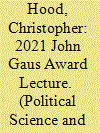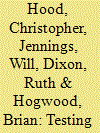| Srl | Item |
| 1 |
ID:
186706


|
|
|
|
|
| Summary/Abstract |
I am not sure if surprise, delight, or gratitude best describes my feelings about receiving this great honor. I experienced all of those emotions in full measure. I must begin by sincerely thanking the American Political Science Association (APSA) Public Administration Section for conferring the 2021 John Gaus Award on me and by saying how much it means to me. Looking at the list of previous John Gaus Award winners, I am indeed awed to be included in their number. There are so many names whose work I have deeply admired and others whom I have known quite well. Just three examples are George Frederickson, Vincent Ostrom, and Aaron Wildavsky, all of whom were extraordinarily kind and generous to me and greatly influenced my work. I only wish they were still here so I could thank them for all they did for me. The same is true for other now-departed mentors, including Mary Douglas, Andrew Dunsire, and Bill Mackenzie, to mention only a few.
|
|
|
|
|
|
|
|
|
|
|
|
|
|
|
|
| 2 |
ID:
091076


|
|
|
|
|
| Publication |
2009.
|
| Summary/Abstract |
This article examines the responses of ministers facing high levels of blame in the press after serious failures in the public exam system for school-leavers in Scotland in 2000 and England in 2002. It develops a method for systematic analysis and comparison of the behaviour of officeholders facing blame, tests the hypothesis that ministers will accept personal culpability only after other ways of handling blame have been exhausted and uses time series intervention models to show how one can estimate the impact of strategies on the next day's blame level. The basic sequencing hypothesis is partially upheld by the observed behaviour in these cases, though many other kinds of blame responses do not display a clear sequence. The intervention analysis also raises questions about the claimed effectiveness of presentational strategies for managing blame.
|
|
|
|
|
|
|
|
|
|
|
|
|
|
|
|